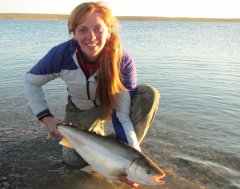Congratulations to the seven winners of this year’s Graduate Research and Innovative Thinking (GRIT) awards. The Graduate Studies created these awards two years ago to recognize outstanding Carleton PhD students at the ABD stage of their research (all comprehensive exams have been completed and the dissertation proposal has been successfully defended). These awards provide funding to support excellence and involvement in academic research activities. Each student will receive up to $5,000, depending on his/her ask.
The winners are:
Dunja Apostolov-Dimitrijevic (Political Science)
Apostolov-Dimitrijevic will be using the GRIT award to attend the Annual Conference of the British Association for Slavonic and Eastern European Studies at Cambridge University, and to spend two weeks as a visiting researcher at the National University of Ireland Maynooth. Her research examines the political and economic trajectory of the Western Balkans, focusing on the diplomatic, economic and cultural connections that have been established between the region and various emerging economies. Her research asks how these emerging networks are constituted and articulated in the region, and how they relate to the region’s growing integration into the European Union.
 Jacqueline Chapman (Biology)
Jacqueline Chapman (Biology)
The GRIT award will provide Chapman with support to attend the International Conference of Fish Telemetry in Cairns, Australia. While in Australia, Chapman will travel to James Cook University to visit with Dr. Jodie Rummer, a leading researcher in fish stress physiology and advocate for women in science. Chapman’s research focuses on how disease is an under-appreciated factor that influences the survival and movement of animals. Specifically, Chapman hopes to identify specific pathogens that are directly related to increased mortality in catch-and-release fisheries.
 Sara Gilani (Civil and Environmental Engineering)
Sara Gilani (Civil and Environmental Engineering)
Sara Gilani is monitoring and modelling occupant behaviors for the prediction of building energy performance in office spaces. She will be using her funds to present her research on modeling lighting use patterns in the monitored offices at the 15th International Conference of Building Simulation. This conference brings together the world’s leading experts in the field of energy-efficient buildings and building simulation. There, she will have an opportunity to disseminate her research findings and enhance collaboration with international researchers in her field.
 Alejandro Hernandez (Sociology)
Alejandro Hernandez (Sociology)
Alejandro will be using the funding received from the GRIT award to present preliminary research results at a panel he organized and is chairing regarding the intersectional experiences of Latin Americans in diaspora – both in the global South and North – but outside of the United States. The panel will take place in Peru at the annual congress of the Latin American Studies Association, the top international conference for Latin American studies. Hernandez’s research examines how Mexican immigrant and refugee youth’s integration processes in Montreal and Ottawa, particularly in the education and employment arenas, shape both their sense of belonging and potential involvement in transnational activities.
 Sarah Katz-Lavigne – (Norman Paterson School of International Affairs)
Sarah Katz-Lavigne – (Norman Paterson School of International Affairs)
Katz-Lavigne will be using the funds from the GRIT award to fund her doctoral field research in the Democratic Republic of the Congo (DRC). Her research explores governance dynamics at and around large-scale mine sites in the DRC. Katz-Lavigne’s research examines how mining companies manage their access to resources in a context of the state’s relative absence. Katz-Lavigne, who is currently based in the DRC’s Katanga region, will be able to provide fine-grained detail on property rights regimes and governance dynamics at four different mining sites.
 Emily Mastronardi (Chemistry)
Emily Mastronardi (Chemistry)
Mastronardi will be using her GRIT award to purchase specific DNA synthesis reagents to carry out her research. She will examine DNA aptamers which are an innovative solution for detecting small molecules and creating sensors. Measuring the binding affinity of an aptamer for its small molecule target has been a major challenge in the field, and this award will be used to develop methodology to bridge aptamers into therapeutic applications.
 Shaun Stevenson (English Language and Literature)
Shaun Stevenson (English Language and Literature)
Stevenson will be using his GRIT award to travel to the 2017 meetings of the Indigenous Literary Studies Association (ILSA) and the Native American and Indigenous Studies Association (NAISA) which will be held in Vancouver this summer. He will be presenting a section of his dissertation. Stevenson’s research focuses broadly on Indigenous and non-Indigenous relations in Canada in order to explore the potential for a reconfigured and more ethical approach to land rights issues. Specifically, he looks at the potential for water to challenge dominant land-based conceptions of fixity.
—Story written by Mitch Jackson
Tuesday, October 25, 2016 in Awards, Grad Student Research
Share: Twitter, Facebook



